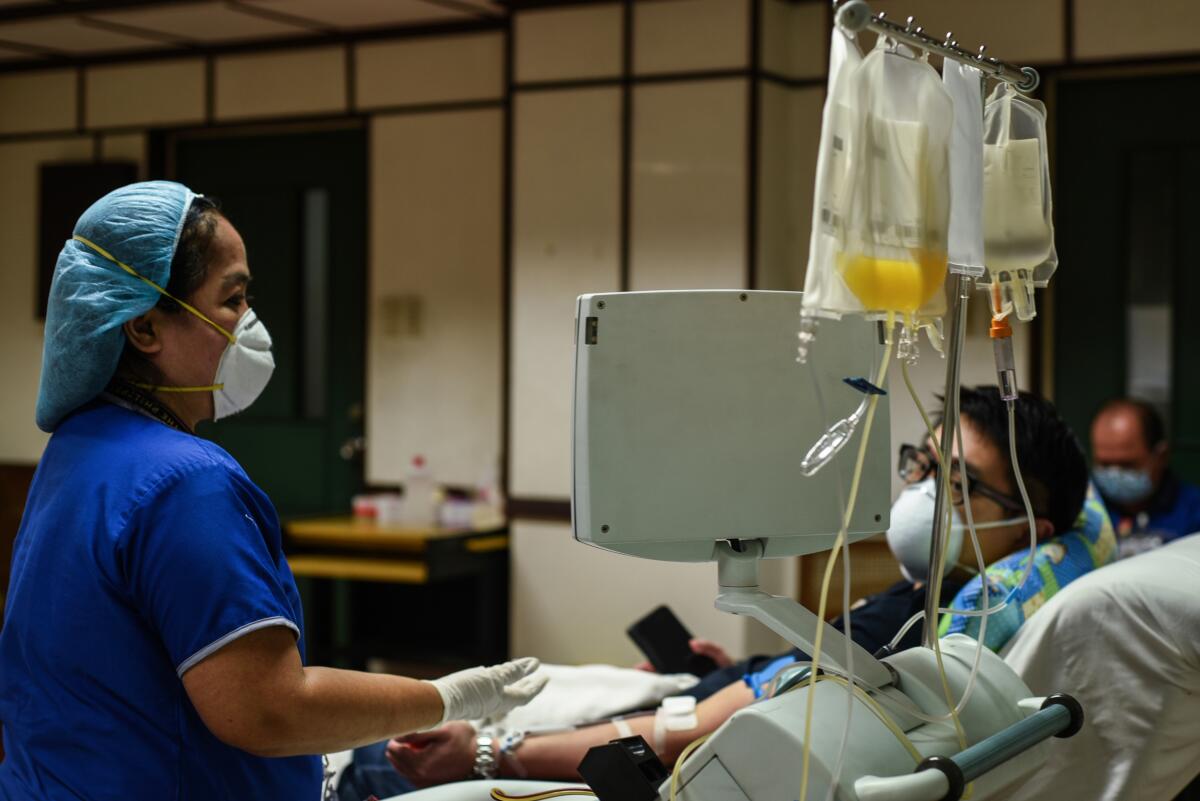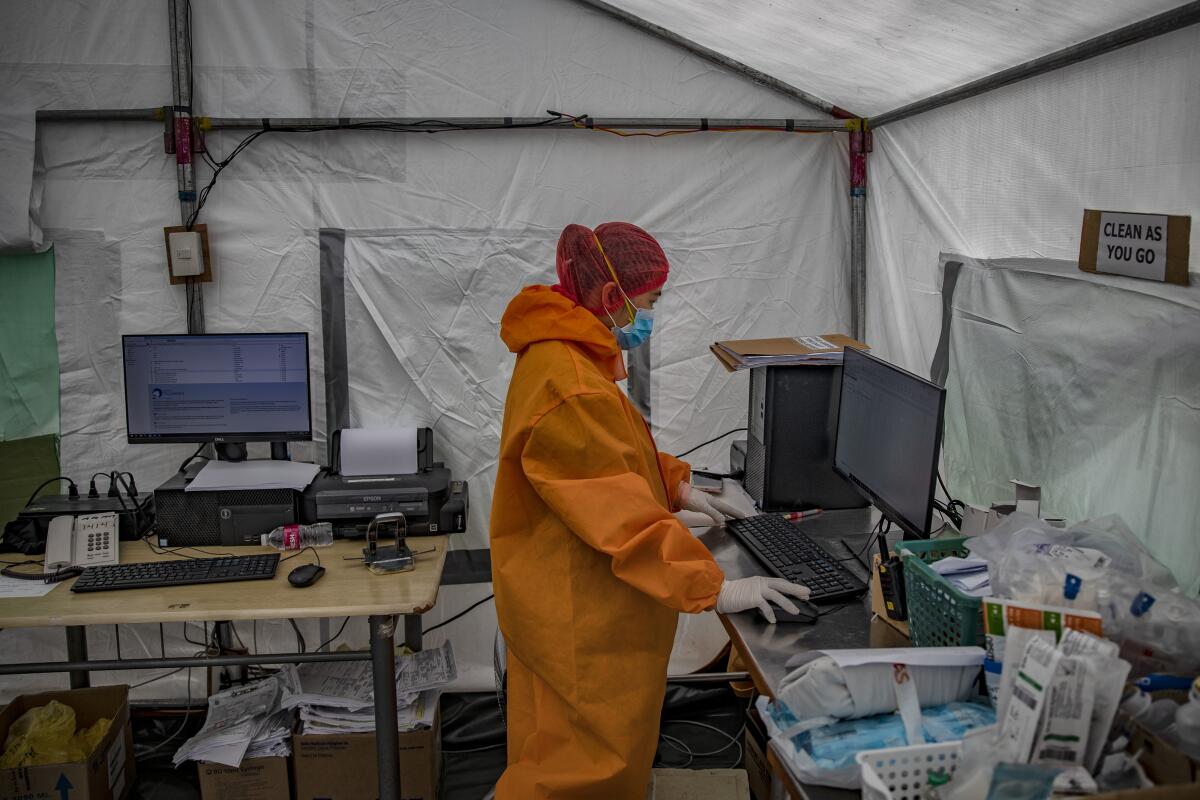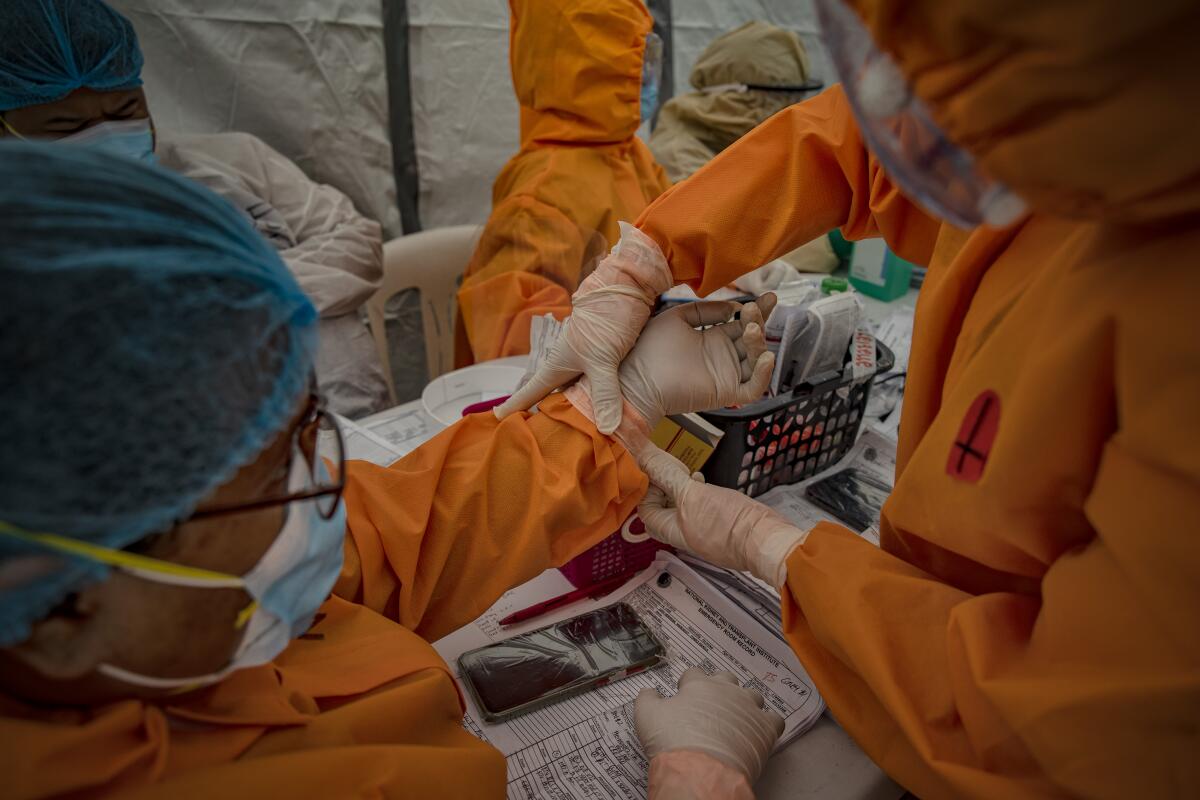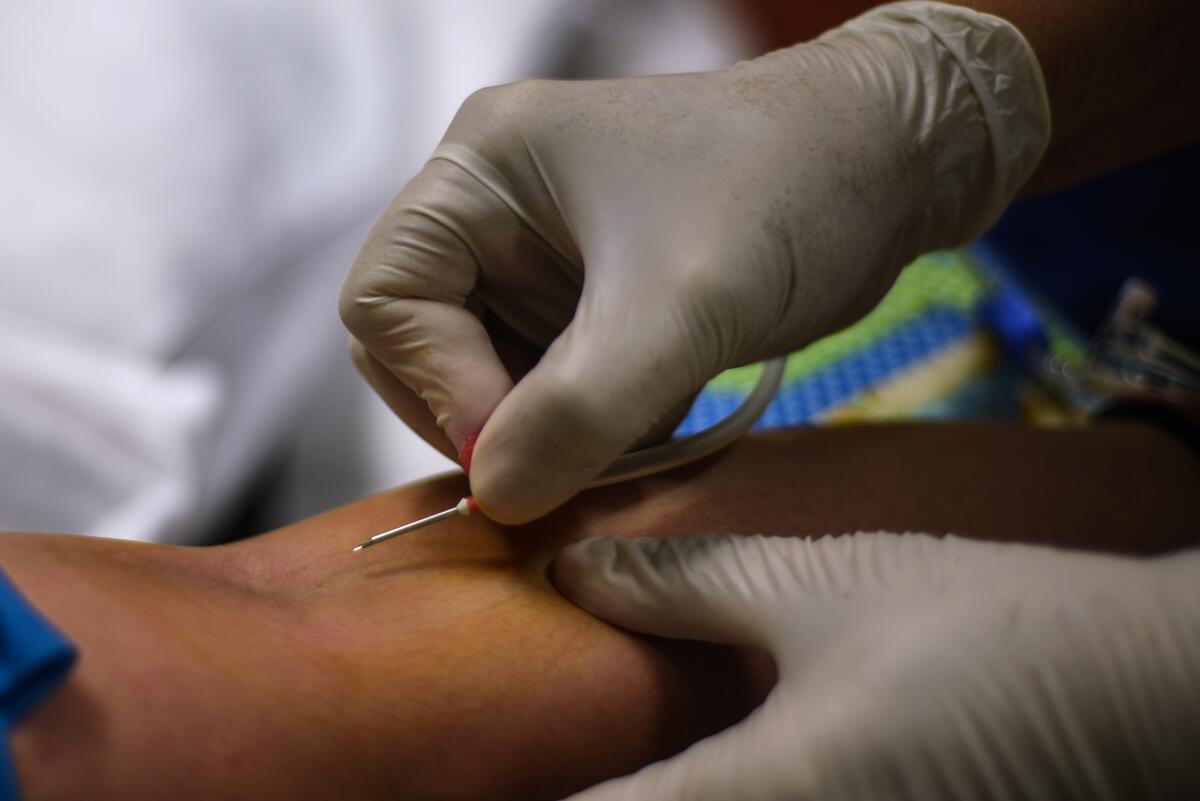Long treated like exports, nurses in Philippines now told to stay home to fight coronavirus

- Share via
MANILA — After decades of exporting its nurses to other countries, the Philippines is now pressuring them to stay home to fight the coronavirus.
The country, which is experiencing the second-most deadly outbreak of the disease in Southeast Asia after Indonesia, has barred health workers with new contracts from overseas jobs and launched an emergency hiring program to shore up a medical system that was failing even before the pandemic began.
The changes mark one more twist in the complex history of Filipino and Filipina nurses, whose professional origins date back to American colonial rule more than a century ago when they were trained to care for U.S. soldiers.
Often tapped to fill shortages in other nations, Filipino and Filipina nurses are the backbone of many healthcare facilities across the world and disproportionately planted on the front lines against COVID-19. In California, nearly one-fifth of registered nurses are ethnic Filipinos in a state where less than 4% of the population is Filipino.
“If our nurses were to come back from overseas, the healthcare systems of those countries would collapse,” said Ted Herbosa, former Philippine Health Department undersecretary and an advisor to the nation’s COVID-19 task force.
Lorena Rolando was about to leave for a nursing job in Germany until travel restrictions closed international borders. Now she finds herself bemused and exploited at her country’s sudden outpouring of recognition for front-line health workers and patriotic appeals for them to stay home.
“It feels like a slap in the face,” said Rolando, whose first nursing job in Manila a decade ago paid her $7 per 12-hour shift. “If this pandemic didn’t happen, they wouldn’t appreciate nurses and the work we do. They just see us as someone who washes the patient’s” behind, she said.

Nurses were once criticized for leaving the Philippines. But in the 1970s the country began promoting the export of caregivers and other Filipino workers whose remittances lifted the economy. Those who went abroad were portrayed as national heroes. Today, money sent home by Filipino workers accounts for 10% of the nation’s gross domestic product, roughly equal to the role exports play in the U.S. economy.
The pandemic threatens that economic model. Domestic workers from the Philippines can’t reach employers in places like Hong Kong and Saudi Arabia, and the lull in maritime transportation, particularly cruise ships, threatens the livelihoods of hundreds of thousands ofFilipino seafarers.
Nurses, on the other hand, are being told jobs await them at home. But a tradition of exploitation marked by grueling work hours and little to no pay has left many skeptical of answering the call.
Safety concerns are high given the dearth of protective gear. At least 21 doctors and six nurses have died of the virus in the Philippines. President Rodrigo Duterte angered the medical community when he said in March health workers were “lucky to die” in service of their country. Critics say the veneration of workers is designed to justify their sacrifice and obscure the government’s failings.
“Filipino nurses have long been treated as products for export — produced and marketed to wealthier countries looking to buy cheaper labor for their own understaffed hospitals,” said Yasmin Ortiga, a sociologist at Singapore Management University and an expert on nurses from the Philippines. “The pandemic changes the dynamic in that now. ... But in the end, the nurses are still treated like commodities to use, and not as people who deserve proper compensation and support.”
The government initially sought volunteers to plug the shortage of health workers with a $10 daily stipend. That was met with public outrage, resulting in the introduction of the emergency hiring program that offers potential full-time employment, hazard pay and a lump sum of about $20,000 in case of death.
It is unclear if the country will find enough takers, especially among nurses furious about being barred from taking positions waiting for them in other countries. At least 1,700 applications have been received in the last two weeks, according to the health department, which is seeking 15,700 workers to staff its COVID-19 facilities.

Nurse advocates say applicants are wary because the poor conditions and low wages that drive thousands of nurses to seek work overseas persist. Nurses are still waiting for the salary increase set by the Supreme Court in October that would triple wages in public hospitals to at least $600 a month.
The irony of preventing health workers from going overseas is that the country of 108 million should have an ample pool of candidates to draw from — despite reports of a nursing shortage. The Philippines is living with the legacy of a nursing boom that peaked in 2005 when there were about 370 nursing schools that took in about 400,000 students annually.
The glut created a market for labor in which hospitals preyed on graduates who needed work experience — often as much as two years — to qualify for jobs overseas. In practices that have since been banned, hospitals established volunteer positions with no pay and “work for a fee” schemes packaged as in-hospital training programs that came with price tags as large as $300.
A nationwide survey in 2016 conducted by the advocacy group Alliance of Young Nurse Leaders and Advocates found two-thirds of its 750 members had paid a fee to work or worked for free. Respondents said that the experience left them feeling a sense of degradation.
Only one-fifth of the 475,000 nursing graduates from 2012 to 2016 found employment abroad, government statistics show. Many of those left behind looked at the prospects at Philippine hospitals and decided to seek jobs as call center agents, flight attendants and hotel workers instead.
Jean Seno’s decade as a nurse has mostly been a series of contractual jobs that meant she would be employed for only a few months at a time, with low wages and long hours. She started her career in her hometown of Cotabato in the southern Philippines as a trainee with no pay. Feeling hopeless about work conditions ever improving, she recently sought employment overseas.
“I think I have served my country long enough. It’s time to think of myself,” said Seno, 30, who eventually accrued enough continuous experience to receive an offer to work at a hospital in Britain.
She said she’ll leave as soon as travel restrictions are lifted.
Hospitals badly need experienced nurses like Seno, but the country’s decentralized health system gives local authorities discretionary powers to direct funds toward more politically beneficial expenditures.
“Rather than spend on increasing salaries of health workers, local officials would rather spend on roads and infrastructure — the tangible things that voters can see and remember,” Herbosa said.

That’s resulted in dire underfunding and scant medical resources in a country where 7 in 10 people die each year without ever seeing a health professional. Private hospitals are just as chronically understaffed and pay nurses even less than public institutions. Collectively, the ratio of nurses to patients in the Philippines of between 1-to-50 and 1-to-80 falls far below the Department of Health Standards prescribed ratio of 1-to-12.
“The Philippines has a worse nurse-to-patient ratio than countries like the U.S., U.K. and Canada — the same countries they’re exporting nursing professionals to,” said Catherine Choy, a professor of ethnic studies at UC Berkeley and author of “Empire of Care: Nursing and Migration in Filipino American History.”
That fact is not lost on some Filipina and Filipino nurses.
Jhong dela Cruz left the Philippines five years ago to take up a nursing job at a hospital in Washington, D.C. The 26-year-old said he feels more fulfilled in the U.S. because doctors treat nurses as equals.
Still, he follows reports of the outbreak in the Philippines, where 60 million people remain under lockdown on Luzon, the island that encompasses the sprawling capital of Manila. He fears for the safety of his medical counterparts and can’t suppress his guilt for being so far away.
“The other day, I administered eye drops to someone else’s mom, measured the blood sugar of someone else’s dad,” he said. “In my heart of hearts, I want to do this for my own people. I want to be the one to take care of my family if they get sick. The salary and the job security of choosing to work here comes with its own pain.”
Times staff writer Pierson reported from Singapore and special correspondent Santos from Manila.
More to Read
Sign up for Essential California
The most important California stories and recommendations in your inbox every morning.
You may occasionally receive promotional content from the Los Angeles Times.











